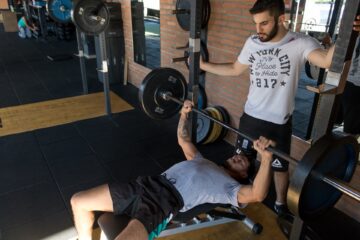Caffeine and Performance
How does caffeine intake affect your performance in and out of the bedroom?
Caffeine, especially from coffee, is an extraordinarily popular component of daily life for most Canadians.
In one of our previous articles, love2lose.com highlighted the connection between caffeine intake and both sexual and physical performance.
Today, in celebration of Caffeine Month, we will explore that relationship more closely.
Caffeine and Sexual Performance
Let’s start the conversation by looking at what science says about the connection between caffeine intake, erectile dysfunction and testosterone.
In one recent study, men who consumed caffeinated coffee daily actually saw increases in their testosterone levels. This a very interesting finding because testosterone is the primary male sex hormone and reductions in testosterone levels can contribute to erectile dysfunction and reduced sex drive in some men (Lopez et al., 2015).
We also know that men (including overweight and obese men) who drink about 2-3 cups of coffee daily have a reduced risk of suffering from erectile dysfunction. People living with diabetes did not enjoy this benefit however, which relates back to our previous article, Eating Your Way to Better Sex with Diabetes, discussing the importance of controlling your blood sugar levels to prevent erectile dysfunction in diabetes (Wedick et al., 2012).
Speaking of diabetes, coffee intake (both caffeinated and decaffeinated) is actually associated with a reduced risk of type 2 diabetes (Lopez et al., 2015).
From the female perspective, caffeine intake has often been linked with the symptoms of PMS. There is, however, no strong evidence to suggest that cutting caffeine has any effect on PMS ( Purdue-Smithe et al., 2016).
Caffeine and Physical Performance
A big part of what we do here at love2lose.com is focus on the connection between physical and sexual performance.
We embrace the link between these two separate, yet related concepts and so it only makes sense that we would also look at how caffeine can contribute to, and improve, our exercise performance outside the bedroom as well.
Here’s what we know about caffeine intake before physical activity (Burke, 2008):
1) It helps us to be more alert, especially when we are tired or sleep deprived.
2) It can contribute to an improvement in performance in endurance activities and team sports that range in length from 1 to 60 minutes.
3) It doesn’t contribute to dehydration as some previously thought.
In summary, science tells us that when we take in caffeine before physical endeavours, we tend to perform better.
Sexercise Connection
Today’s article is a perfect example of the Sexercise lifestyle, which is all about combining our understanding of how aspects of everyday life can impact both sexual and physical performance.
Hopefully you’ve learned a few new things about caffeine that will benefit your performance both in and out of the bedroom.
Bonus Fact: For those who don’t like drinking coffee or tea, chocolate covered coffee beans are a very rich source of caffeine for those who may be looking for a little boost.
Source
Wedick NM, Mantzoros CS, Ding EL, et al. The effects of caffeinated and decaffeinated coffee on sex hormone-binding globulin and endogenous sex hormone levels: a randomized controlled trial. Nutrition Journal. 2012; 11:86. doi:10.1186/1475-2891-11-86
Lopez DS, Wang R, Tsilidis KK, et al. Role of Caffeine Intake on Erectile Dysfunction in US Men: Results from NHANES 2001-2004. Walter M, ed. PLoS ONE. 2015;10(4):e0123547. doi:10.1371/journal.pone.0123547
Ding M, Bhupathiraju SN, Chen M, Van Dam RM, Hu FB. Caffeinated and decaffeinated coffee consumption and risk of type 2 diabetes: a systematic review and dose-response meta-analysis. Diabetes Care. 2014; 37(2):569-86. doi: 10.2337/dc13-1203
Purdue-Smithe AC, Manson JE, Hankinson SE, Bertone-Johnson ER. A prospective study of caffeine and coffee intake and premenstrual syndrome. The American Journal of Clinical Nutrition. 2016;104(2):499-507. doi:10.3945/ajcn.115.127027
Goldstein ER et al. International society of sports nutrition position stand: caffeine and performance. Journal of the International Society of Sports Nutrition20107:5 doi: 10.1186/1550-2783-7-5
Burke LM. Caffeine and sports performance. Appl Physiol Nutr Metab. 2008 Dec;33(6):1319-34. doi: 10.1139/H08-130



0 Comments